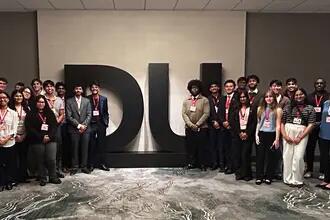
A top student savored campus experiences and community
Senior Goodness Ifesanya navigated his way through college with a purposeful grace, pursuing opportunities, taking on responsibilities, and learning the importance of community.
He studied finance and economic development with the passion of someone hoping to put his knowledge to use to end disparity in health care and housing, and even more ambitious: to develop ways of improving the performance of economies in developing countries.
While maintaining a near 4.0 grade point average, he served as chief financial officer for Rutgers University Newark’s student government, and secured internships at Grant Thornton and Bank of America. He co-founded a new student organization and as a freshman, played a key role in his team’s first place win in a case competition.
“Every single experience I’ve had here has challenged me to become not only a better person, but a person who is capable of handling more and more difficult things,” Ifesanya said, months before he was scheduled to graduate from Rutgers Business School and leave the Honors Living-Learning Community where he has lived for four years.
From a young age, Ifesanya loved learning about investing and the stock market, so it seemed natural that he chose to study finance. “It seemed to be the most direct corollary to the things I wanted to research and work on,” he said.
That interest in finance also led him to apply to Road to Wall Street, the most established of Rutgers Business School’s Road to Success programs. Road to Wall Street offers mentorships, industry knowledge and career preparation to selected sophomores.
Leveraging what he learned in the program, Ifesanya landed a summer internship as a financial analyst at Grant Thornton after sophomore year. The recruiter was impressed with his knowledge of valuation and discounting rates, which Ifesanya learned through Road to Wall Street.
Road to Wall Street Program Director Kenneth Freeman said Ifesanya stood out by the questions he asked. “It was evident that he was thinking in depth about every subject that was covered, and that curiosity is exactly what will propel him to career success,” Freeman said.
After his junior year, Ifesanya scored a role at Bank of America as an investment banking summer analyst. He has accepted an offer to work at Bank of America as a full-time investment banking analyst after graduation.
His involvement in Road to Wall Street also made him realize that some of the most meaningful opportunities on campus aren’t known to all students. Ifesanya was one of five students from Newark in his Road to Wall Street cohort of 60.
“I would be talking with students from New Brunswick who knew they wanted to do Road to Wall Street in high school and that was one of the reasons they decided to attend Rutgers Business School,” he said. “Then I’d come back to the Newark Campus and people would tell me, I had no idea there was a program like that. I would have done it if I had known.”
The realization that the communication about opportunties was so different on the two campuses led Ifesanya and his classmate, Chinonso Anyanwu, to form a student organization that could fill the void by providing information to incoming and first-year students.
“There are so many programs you need to be aware of coming in the university to be able to take full advantage of them and set yourself up on the right course for whatever career you want,” Ifesanya said. “We felt there was a need to inform and nurture incoming students.”
Ifesanya credits Charles Brown, an assistant dean at Rutgers Business School who leads the IDEA Office, with directing him to career-preparing programs like Road to Wall Street. Ifesanya was a member of Business Student Transition Access and Retention (B-STAR), a program Dean Brown oversees.
Ifesanya said he grew during college as he took on more responsibility – “You know that saying that pressure makes diamonds, he said, smiling. “I really enjoyed taking on those responsibilities.” – and he benefited from support systems like the HLLC and B-STAR and older Rutgers students, who he described as some of his “most valuable resources.”
“They would point you in the right direction,” he said. That’s how he became involved with Future Business Leaders of America. That led him to another role: chief financial officer of the student government. As the student government’s CFO, he was responsible for overseeing 60 clubs and their finances.
Brown described getting to know Ifesanya through his college journey as a “distinct privilege.”
“Goodness has exemplified dedication, leadership and a commitment to giving back. He is an inspiration to current and incoming students,” Brown said. “His passion for supporting Rutgers Business School’s IDEA programs and initiatives promises a future of continued impact.”
It’s difficult for Ifesanya to pinpoint one thing made the biggest impact on him during college, but he zeros in on community, the sweeping collection of influences and experiences Rutgers offered him.
Being chosen for the Honors Living-Learning Community meant a full scholarship for housing, and exposure to students focused on political and social understanding. It was space that allowed him to think deeply about his interest in the economies of developing countries.
The IDEA Office enriched him by providing a scholarship to visit Singapore and Vietnam through a Rutgers-organized Global Experience Initiative. He also received scholarships throughout his time at college from the MSD Scholars Initiative, the EY Accelerator Program and FISERV.
While some seniors with a full-time job offer might have changed gears, opting to glide through their final semester, Ifesanya completed his honors thesis, spent time mentoring younger students and worked a paid internship with the university’s investment office, where he helped to manage a $2 million endowment.
Ifesanya also was inducted into the New Jersey Collegiate Business Administration Association (NJCBAA) Honor Society. The recognition is bestowed on the top 1% of students at business schools in the state. The percentage is even smaller this year, closer to 0.1 %, because just seven students were selected from Rutgers Business School.
Ifesanya’s willingness to seek the counsel of older students, make connections and take on new responsibilities may have resulted from a success he experienced during his first months on campus.
After he joined Future Business Leaders of America, he decided to do a case competition. “I didn’t know what to expect. I had no idea what a case competition was,” he said, chuckling. “I heard it was competitive. I knew we had to present.”
The team was mostly seniors and juniors, and some sophomores, so Ifesanya wondered what he would be able to contribute. The 30-page case involved the launch of a new prescription medicine. “It was complicated,” he said. The healthcare jargon, alone, challenged the team. “I sort of became the backbone of the team,” Ifesanya said.
The team ended up winning first place. “That was the first time I realized, Oh I can do this,” he said. “I can succeed here and be at the top of my class. It was a foundational experience as a freshman.”
Press: For all media inquiries see our Media Kit


